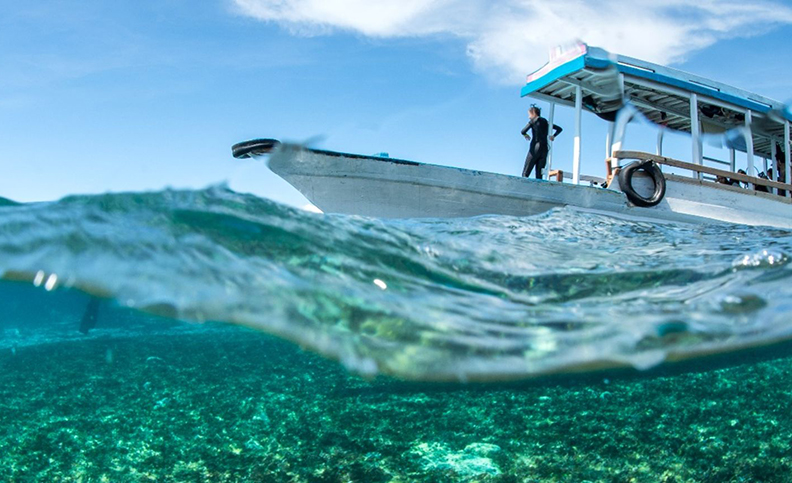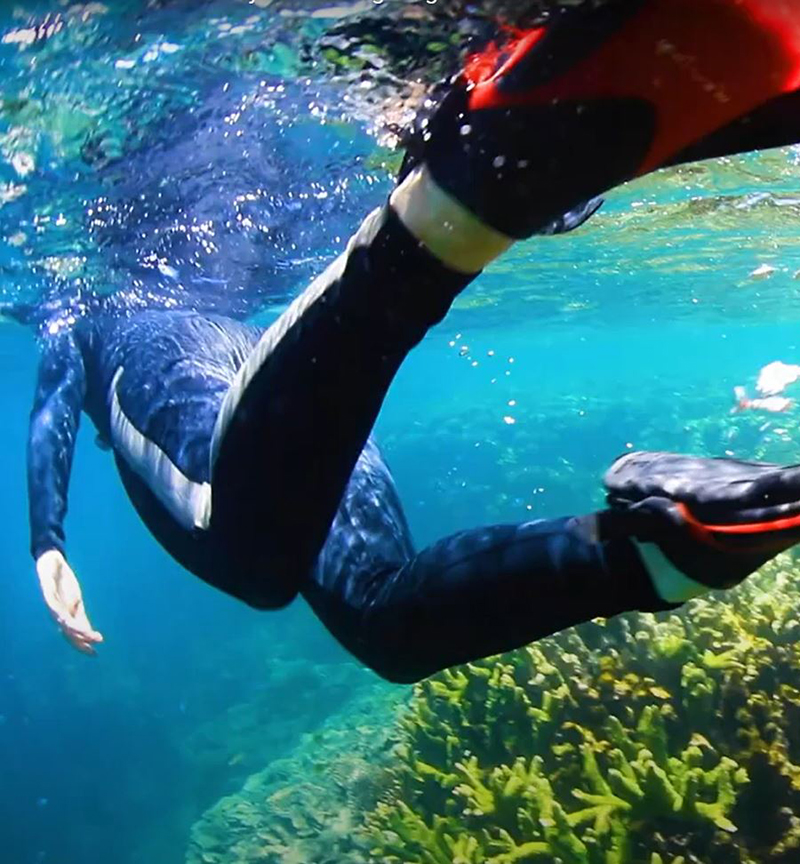Postgraduate
Master of Oceanography
Contact us
Address
Student Central
The University of Western Australia (M355), 35 Stirling Highway, Perth, Western Australia 6009
Telephone
131 UWA (131 892)
International
(+61 8) 6488 1000
Hours
Frequently asked questions
Events you may be interested in
Show more eventsCareers and further study
Explore the career opportunities available to you.
Career Pathways
The Master of Oceanography has core units that seek to ensure students have strong interdisciplinary knowledge and technical skills to take advantage of diverse career opportunities in government, industry, consultancies and research institutions. The need for marine and coastal management, marine renewable energy, safe use of the ocean and aquaculture will require graduates with interdisciplinary knowledge of oceanography.
Job opportunities could include:
Oceanographer
Oceanographers broadly understand and inter-relate all aspects of the ocean. Examples include the processes that drive ocean currents, how the oceans regulate our climate, and the links between ocean chemistry and biological processes. Oceanographers are employed in many areas including companies who operate in the oceans, consulting companies who advise industry or government, and government agencies. Specific tasks oceanographers undertake may include:
- Understanding the physical, chemical and/or biological processes in the ocean
- Predicting oceanographic processes like waves and currents for a range of applications (e.g. industry-access and public-access forecasting)
- Studying the links and predicting the impacts of climate change on the ocean environment and biology
- Collecting and analysing oceanographic datasets
- Predicting how ocean processes impact a range of activities such as shipping, aquaculture, and marine renewables
- Assisting in the design of marine infrastructure
- Providing input to marine managers, governments, and the general public on how ocean processes impact a range of societal issues (e.g. marine parks)
- Developing short- and long-term plans to address coastal erosion and flooding associated with climate change
- Developing coastal erosion and inundation mitigation strategies
- Overseeing coastal mitigation works
- Assisting in the design of coastal protection structures, coastal access facilities, and marine facilitates (e.g. ports)
- Communicating coastal hazards to the general public and industries situated on the coast
- Rehabilitating and enhancing coastal and marine environments and habitats
- Assessing and mitigating coastal erosion and inundation hazards
- Collecting and analysing marine and coastal data sets
- Advising government and industry on coastal and marine infrastructure design
- Deploying and delivering real-time data streams to inform marine operations
- Designing and enacting marine monitoring programs
- Developing and delivering marine forecasts
- Assessing marine impacts from proposed coastal and marine developments
- Designing and enacting mitigation strategies for industrial impacts to the marine environment
- Rehabilitating and enhancing coastal and marine environments and habitats
- Coastal Geologist
- Meteorologist
- Fisheries Scientist
- Marine Conservation Specialist
- Marine Geochemist
- Applied Ocean Scientist
- Climate Scientist
- Ocean Data Scientist
Coastal Manager/Officer
Government agencies that have oversight or an interest in the coast typically employ coastal managers or officers. Coastal managers/officers are key to developing and enacting coastal planning measures and ensuring safe and continued access to the coast for the general public. As a coastal manager/officer your tasks may include:
Coastal and Oceanographic Consultant
Given the complexity of coastal and oceanographic processes many government agencies and industries hire specialised consultants to conduct studies and advise them on a range of activities. As a coastal or oceanographic consultant your tasks may include:
Other job opportunities may include:
Fees and scholarships
Learn more about the fees that apply to you for this course.
Domestic Student Fees
For Commonwealth-supported places, student contribution amounts are charged by unit, based on area of study. For a fee estimate, go to the Fee Calculator and select “I want to price my units”. Fees are subject to annual indexation. Refer to the Handbook to identify the units required. More information on how fees are calculated.
Domestic Student Fees for Full-Fee Paying Places
If you're not eligible for a Commonwealth-supported places, you will be charged a for Full-Fee Paying place. For Full-Fee Paying places, students are charged an annual course fee, charged per credit point at a rate dependent on the course in which the student is enrolled. Annual course fees are calculated based on an annual study load.
Check the handbook to confirm the annual study load for your course. Visit the Fee Calculator and select your course type to find out more. Fees are subject to annual indexation. More information on how fees are calculated.
Scholarships
Scholarships are available to students from a diverse range of backgrounds, including academic achievement, financial need, educational disadvantage, leadership and community service, artistic or sporting achievements, and being from a rural or remote area.
Cost of living
International Student Fees
Onshore international students are charged an annual course fee, charged per credit point at a rate dependent on the course in which the student is enrolled. Annual course fees are calculated based on an annual study load. Check the handbook to confirm the annual study load for your course.
Find out more about international student tuition fees and visit the fee calculator for the relevant course fees.
Fees are subject to annual indexation.
Scholarships
Scholarships are available to students from a diverse range of backgrounds, including academic achievement, financial need, educational disadvantage, leadership and community service, artistic or sporting achievements, and being from a rural or remote area.
Cost of living
Admission requirements
If you’re interested in furthering your career by studying this postgraduate course, find out the admission details below
Admission Requirements
(a) a Bachelor of Science, or an equivalent qualification, as recognised by UWA;
and
(b) the equivalent of a UWA weighted average mark of at least 50 per cent;
and
(c) successfully completed prior tertiary study in—marine science, environmental, engineering or physical sciences; or a related cognate discipline, as recognised by UWA
Ranking and Selection Process
English competency
English is the language of instruction and assessment at UWA and you will need to meet the English language requirements of the University to be eligible for a place.
Minimum overall IELTS score of 6.5, with no band less than 6.0.
How to apply

Ready for the next step?
Find out how to apply through our simple online application process.
We'll guide you through our entry requirements, admission pathways available to you and application deadlines for your chosen course.
We can’t wait for you to join us!
Course details
This course will be subsidised for Australian residents through Commonwealth Supported Places (CSP) as of Semester 1, 2024. Visit our Tuition Fee Calculator for CSP rates and an estimate on your course fees.
About the course
Quick details
- Available
- Perth (Crawley campus)
- Full-time
- Part-time
- On-campus
- Partially Online
- Semester 1, Semester 2
- Postgraduate
- 71590
- 107555J
Course structure
Postgraduate coursework degrees and combined (coursework and research) degrees comprise a number of units. Refer to the course structure for more information.
Why study this course?
- The Master of Oceanography is the only course of its kind in Australia and will leverage Western Australia's position on the Indian Ocean and unique marine environment including pristine coastal areas and ocean processes shaped by the Indian and Southern Oceans.
- As a result of the rapidly expanding Blue Economy and impacts of climate change, graduates will increasingly be needed who have knowledge of complex marine systems and can apply this knowledge to tackle a range of challenges.
- UWA has well established teaching and research strength in marine science and engineering so you will be taught by world-leading researchers who are at the forefront of their fields.
What you'll learn
- You will gain knowledge across physical, chemical, geological and biological interactions applied to coastal and ocean systems as well as important practical and problem-solving skills.
- Graduates will become proficient in oceanographic field data collection, data analysis techniques, including the use of industry-standard software.
- You will become skilled at using a variety of ocean models and forecasting tools.
Your teachers

Indian Ocean Marine Research Centre

Purpose-built collaborative facility for marine science and ocean engineering research.
Chao pursues his passion in Oceanography

UWA student Chao Tang, share his reasons for choosing the Master of Ocean Leadership, his scuba diving adventures with the UWA Underwater Club, some interesting facts about this area of study, and his hands-on industry experience with novel artificial-reef modules!
Read the full storyUWA Oceans Institute

The UWA Oceans Institute brings together the University’s multidisciplinary research strengths across areas including oceanography, ecology, engineering, resource management and governance to address key ocean challenges.



